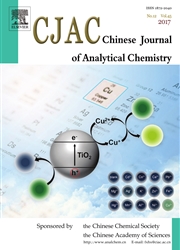

 中文摘要:
中文摘要:
基于核酸外切酶I选择性消化单链核酸的特点,使用MCF-7细胞表面过量表达的肿瘤标志蛋白MUC1的适体,构建了一种灵敏检测乳腺癌细胞的新型电化学传感器。核酸适体链与乳腺癌细胞MCF-7表面过量表达的肿瘤标志蛋白MUC1的结合会阻碍其与互补核酸探针链的杂交,所以电极表面固定的未杂交的核酸探针单链就会被外切酶I选择性消化从而失去末端的亚甲基蓝信号分子。因此,通过检测电化学信号的变化,此传感器在103~106 cell/mL细胞浓度范围内线性检测乳腺癌细胞MCF-7,检出限为330 cell/mL,具有高度特异性,可以有效区分对照细胞胰岛β细胞。
 英文摘要:
英文摘要:
In terms of the characteristic of exonuclease I that can selectively catalyze the degradation of single-stranded DNA, we report a new sensitive electrochemical biosensor for the detection of breast cancer cells by using the aptamers of MUC1 that is overexpressed on the surface of MCF-7 cells. Because the binding of aptamer and MUC1 that is over-expressed on the surface of breast cancer cell MCF-7 can prevent its hybridization with the complementary probe DNA, the unhybridized single-stranded probe DNA that is immobilized on the electrode surface will be selectively digested by Exonuclease I and result in the removal of the signal molecule methylene blue. Therefore, by tracing the changes in electrochemical responses, the biosensor can be used to sensitively detect MCF-7 cells in a linear range from 103 to 106 cell/mL with a detection limit of 330 cell/mL, and easily distinguish the control islet β cells with high specificity.
 同期刊论文项目
同期刊论文项目
 同项目期刊论文
同项目期刊论文
 Electrochemical detection of protein based on hybridization chain reaction-assisted formation of cop
Electrochemical detection of protein based on hybridization chain reaction-assisted formation of cop A colorimetric method for the detection of folate receptor based on terminal protection-assisted cas
A colorimetric method for the detection of folate receptor based on terminal protection-assisted cas Highly sensitive electrochemical aptasensor based on a ligase-assisted exonuclease III-catalyzed deg
Highly sensitive electrochemical aptasensor based on a ligase-assisted exonuclease III-catalyzed deg Electrochemical detection of protein by using magnetic graphene-based target enrichment and copperna
Electrochemical detection of protein by using magnetic graphene-based target enrichment and copperna 期刊信息
期刊信息
